Myanmar’s state counsellor, foreign minister and de facto leader Aung San Suu Kyi is scheduled to make a four-day visit to China starting tomorrow. Ms Suu Kyi is likely to be received as a head of state and meet president Xi Jinping and premier Li Keqiang.
Ms Suu Kyi is expected to discuss a broad range of topics with the Chinese leaders, including Myanmar's policy towards Beijing, trade and other economic cooperation. The visit is significant in a number of ways.
This will be Ms Suu Kyi’s first visit to a foreign country outside of the Association of Southeast Asian Nations (ASEAN) since her National League for Democracy (NLD) came to power in April this year.
The visit comes just before the start of the 21st Century Panglong conference, aimed at achieving peace and national reconciliation in Myanmar, on August 31.
The conference is designed to mimic the one held in Panglong in 1947. The Panglong agreement, signed on February 12, served as the foundation on which the Union of Burma was founded by Aung San (the father of Ms Suu Kyi) and representatives of the frontier people – the Chin, Kachin and Shan.
Ms Suu Kyi and her NLD government understand that Myanmar needs the support and cooperation of China for the success of the upcoming conference with the country’s ethnic minorities.
Her visit is timely because it comes as the Myanmar government is making overtures to three armed organisations – the Myanmar National Democratic Alliance Army, the Ta’ang National Liberation Army and the Arakan Army – which have all been fighting the Myanmar army along the border with China.
On previous occasions, Myanmar has insisted that these three groups surrender their weapons as a condition of signing the Nationwide Ceasefire Agreement (NCA) and participating in political dialogue.
The exclusion of the three armed groups by the previous government of Thein Sein was the primary reason for the failure of the peace process. Because of the government policy, several armed organisations under the umbrella of the United Nationalities Federal Council refused to sign the NCA in October last year.
At the time government peace negotiators suggested that some armed groups did not sign the NCA due to interference from China – which the Chinese government has denied.
The fact that the Kokang people are ethnically Chinese and that the Myanmar National Democratic Alliance Army is led by an ethnic Chinese fighter underscores the crucial role of China in Myanmar’s continuing peace process.
Ms Suu Kyi’s visit also comes before her planned visit to the United States next month. In some ways, this can be construed as a diplomatic victory for China given its close ties with the former military junta that suppressed the voices of the democratic opposition led by Ms Suu Kyi.
Over the years when Suu Kyi and her democratic opposition groups campaigned for the restoration of democracy, it was China that often came to the rescue of the Myanmar junta. Along with Russia, China exercised its veto power at the United Nations Security Council to block a draft resolution on Myanmar in January 2007.
The draft resolution called on Myanmar to release all political prisoners, begin widespread dialogue and end its military attacks and human rights abuses against its ethnic minorities.
When the NLD formed the first civilian government in decades, there was speculation that the new government would end or reduce its heavy dependence on China.
China is likely to use Ms Suu Kyi’s visit to explain its position on the South China Sea dispute. On July 12, the Permanent Court of Arbitration at The Hague made a ruling against Chinese claims regarding the so-called nine-dash-line that it uses to claim sovereignty over a number of important islands. China disputes the verdict and is keen to obtain support from other countries in the region.
Ms Suu Kyi’s acceptance of the invitation to come to Beijing – extended at the ASEAN meeting in Laos in July by Chinese foreign minister Wang Yi – is an indication that she wants to pursue pragmatism despite her feelings towards China during the years she spent under house arrest during the struggle for democracy in Myanmar.
It could also be seen as evidence that she has abandoned her role as an activist, democratic icon and a champion of human rights.
While her approach may serve as a boon to burgeoning relations between Myanmar and China, there continues to be an expectation from rights activists around the world that she speak up for their cause.
Nehginpao Kipgen is assistant professor and executive director of the Centre for Southeast Asian Studies, at the Jindal School of International Affairs in India





